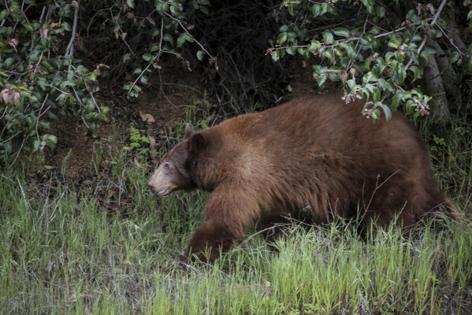Don't feed the bears: State, federal agencies push back against fliers found in Tahoe area
Published in Outdoors
Fliers have reportedly been posted around Lake Tahoe encouraging people to feed bears despite state laws and government agencies stating otherwise.
According to the California Department of Fish and Wildlife and the U.S. Forest Service, fliers have been posted recently in the Lake Tahoe Basin, “encouraging people to feed bears and allow them to access garbage in order ‘to survive.’ This is false and extremely harmful misinformation that is detrimental for bears.”
Additionally, state laws in California and Nevada say it is illegal to feed bears.
“Bears are perfectly capable of surviving on their own and far better off without any human handouts,” the Department of Fish and Wildlife wrote in a January social media post. “By intentionally feeding bears, people are quickly conditioning those bears to associate humans and homes as food sources.
“Bears baited by left-out food and garbage are conditioned to cross the boundary of safe behavior by approaching people, cars, houses, etc., to seek out that food reward. This changes a bear’s natural behaviors and greatly increases the potential for conflict.”
California state law says “no person shall knowingly feed big game mammals,” which include animals such as a pronghorn antelope, black bears, mule deer, mountain goats, mountain lions, elk or bighorn sheep. Nevada state law is similar.
The Department of Fish and Wildlife encourages people to use bear-proof containers to secure their trash, recycling and compost, along with keeping doors and windows closed and locked at all times. Additionally, the department encourages people to clean grills and barbecues thoroughly and store them securely in a shed or garage when not in use. Trash, food and other strongly scented items should be removed from vehicles and yards.
“It’s not possible for communities in bear country to coexist with bears unless people respect boundaries with bears and other wildlife,” the department wrote. “This includes not feeding wildlife, keeping garbage and other attractants away from bears and wildlife and educating oneself on all the best practices when living in bear country.”
Bears sightings throughout the Lake Tahoe Basin are common. Perhaps the most famous case was the 500-pound bear named “Hank the Tank,” who was accused of breaking into dozens of homes in the Tahoe Keys in February 2022. The bear, which drew national attention, was later exonerated when DNA evidence suggested other bears were involved.
©2024 The Sacramento Bee. Visit sacbee.com. Distributed by Tribune Content Agency, LLC.







Comments